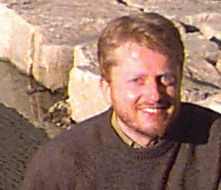Background:
Born and raised on the German island of Helgoland, Dr. Nöckel had
his first encounters with science through summer jobs at
Helgoland's ornithological and marine biology labs.
Dr. Nöckel enrolled in physics at Hamburg University in 1986. After five
semesters, he went to Oregon State University in Corvallis
as a graduate exchange student for one year. He then completed his
German Diplom degree in Hamburg
with a thesis on magnetotransport in semiconductor
microstructures, supervised by H.Heyszenau. In 1992, he began PhD studies
with A.D.Stone at Yale University. With a Pierre Hoge Endowed Fellowship
from Yale, Dr. Nöckel initially worked on electronic transport theory
before micro-optics in deformed dielectrics became the focus of his thesis
work in early 1994. This led to a patent he holds jointly with A.D.Stone
and R.K.Chang. For the thesis, Dr. Nöckel received the Henry
Prentiss Becton
Prize for Exceptional Achievement in Engineering and Applied Science when he graduated from Yale
in 1997. As
a staff member at the Max-Planck Institute in Dresden, he continued
to investigate microresonators. This resulted in a
second patent together with Yale and Bell Laboratories. Since 2000, Dr.
Nöckel is the senior design engineer in the InP optoelectronics
group at Nanovation Technologies, Evanston (IL).
|
Contact Information:
|
Address: |
Jens Uwe Nöckel
Department of Physics
University of Oregon
1371 E 13th Avenue
Eugene, OR 97403, USA.
|
|
|
|
Abstract of the research
Miniaturization in optical resonator development
has reached a point where technological progress can profit from
novel physical methods. The strong
mode confinement in microresonators makes nonlinear and quantum
electrodynamic effects accessible
[1,2,3,4], and is furthermore a
prerequisite for opto-electronic integration. Of central importance
in these developments are waveguiding techniques that confine the
light to an optically dense medium with the help of total internal
reflection. Combining this approach with the use of structures in
which light rays move chaotically, we develop a theory of asymmetric
dielectric resonators in the transition regime between ray and wave
optics.
A 1500 word description of the research can be found here
|

